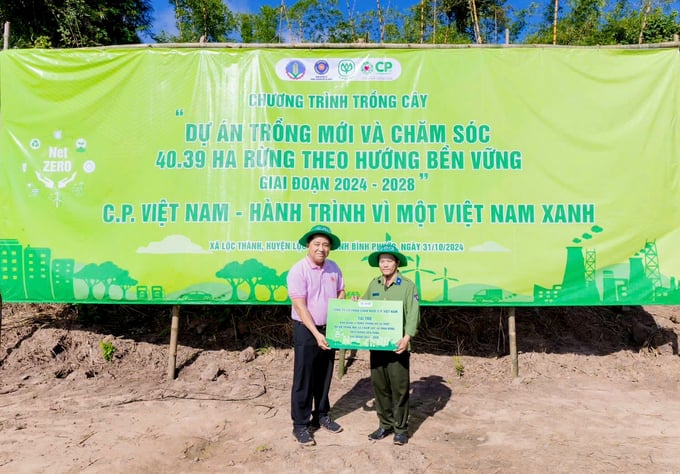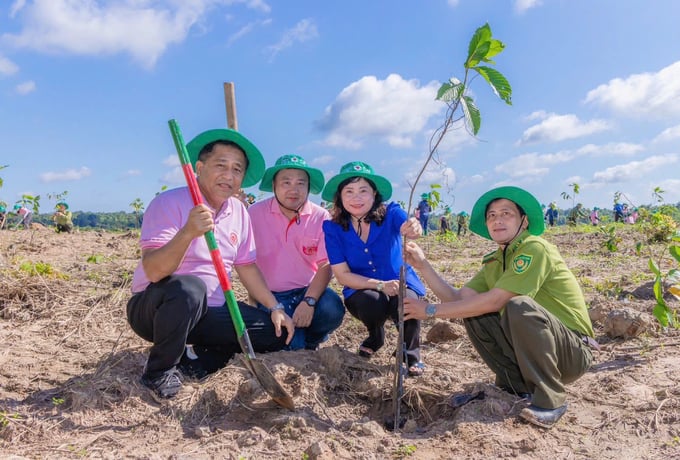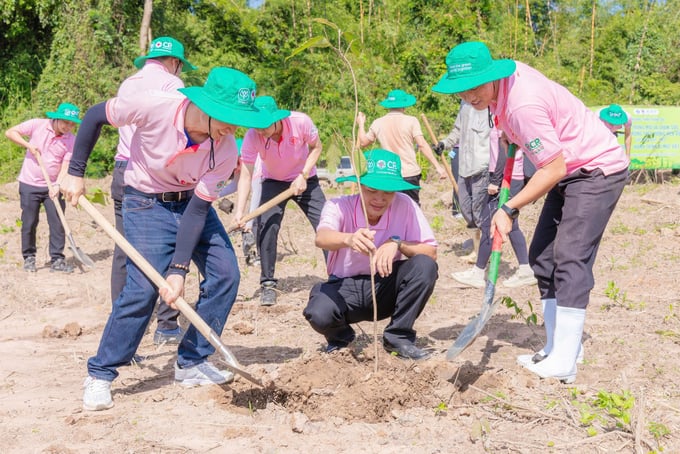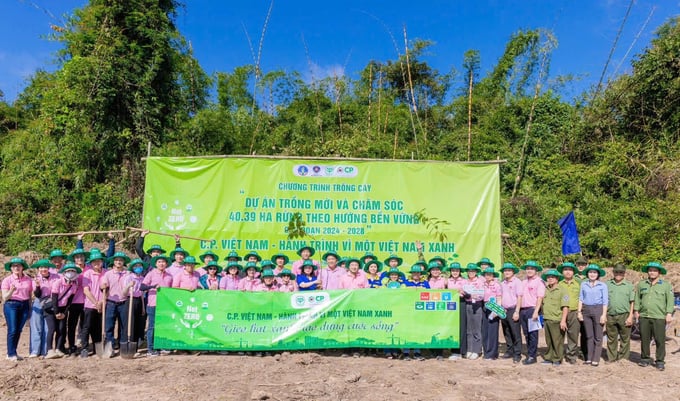May 30, 2025 | 21:40 GMT +7
May 30, 2025 | 21:40 GMT +7
Hotline: 0913.378.918
May 30, 2025 | 21:40 GMT +7
Hotline: 0913.378.918

Mr. Sawang Chanprasert, on behalf of C.P. Vietnam, presented the project sponsorship token to the Management Board.
The handover ceremony, organized on October 31, 2024, by C.P. Vietnam (CPV) and the Ta Thiet Forest Management Board. The parties have handed over the project for planting and caring for forests at plots 4 and 7, sub-area 216, and plot 1, sub-area 218, located in Loc Thanh commune, Loc Ninh district, Binh Phuoc province.
The ceremony was attended by over 80 delegates. Key attendees included Mr. Tran Quoc Hung, Head of Binh Phuoc Forest Protection Department, and Ms. Le Thi Anh Tuyet, Vice Chair of Loc Ninh District People's Committee, alongside leaders from various departments and agencies.
CPV was represented by Mr. Sawang Chanprasert, Senior Vice President of Poultry Breeding Business, along with company leaders and staff. Partners, suppliers, media, and press were also in attendance.

Volunteers joined in planting 400 dipterocarp trees as part of the program.
This project will involve planting and sustainably managing 40.39 hectares of forest from 2024 to 2028. Aligned with Binh Phuoc’s reforestation plans, it aims to boost forest cover, reduce soil erosion, protect water resources, improve the ecosystem, and support sustainable economic development. The project is also intended to promote ecotourism and attract visitors to the Ta Thiet Special National Monument, the former headquarters of the Liberation Army Command.
With over 30 years in Vietnam and a vision as the “Kitchen of the world,” CPV now operates 12 feed mills, 9 food processing plants, and employs over 30,000 staff nationwide. In Binh Phuoc, CPV has established a state-of-the-art, closed-loop 3F production complex (Feed, Farm, Food) to produce processed chicken for export to the world's most demanding markets.

Volunteers joined in planting 400 dipterocarp trees as part of the program.
As part of its commitment to sustainable growth, CPV operates on the "Three benefits" principle: prioritizing the interests of the country and the people first, then those of the company. CPV’s commitment to community and environmental responsibility is evident in its "C.P. Vietnam - Journey for a Green Vietnam" project, aiming to plant 1.5 million trees from 2021 to 2025. This initiative reflects CPV’s dedication to building a sustainable green future for Vietnam.
Understanding that each tree planted today shapes a sustainable future, CPV is committed to caring for and expanding planted forest areas and protecting ecosystems. This is CPV's contribution to Vietnam’s green initiatives and Net Zero goal. The project aims to inspire more people to plant trees and protect the environment, fostering a foundation for a green, clean, and sustainable Vietnam.

Leadership and staff from C.P. Vietnam and relevant departments attended the program.
“For C.P. Vietnam, sustainability is not just a commitment but a core foundation, where the nation’s and community’s interests are always prioritized. We strive to build a sustainable economic ecosystem that harmonizes with society and the environment, so every step forward contributes to a greener, prosperous, and sustainable Vietnam.”
Translated by Kieu Chi

(VAN) Several scientists and farmers are experimenting with soil treatment in some key durian-growing regions such as Cai Lay (Tien Giang), Dak Song, Gia Nghia, and Dak R’lap (Dak Nong).
/2025/05/25/4127-3-073637_820.jpg)
(VAN) Thanks to the promotion from an FAO-implemented project, vegetable production in greenhouses in Moc Chau has seen strong development, from 1.5 hectares in 2021 to nearly 50 hectares in 2024.

(VAN) FAO has recently supported USD 140,000 to implement the project 'Risk mitigation human-animal interface risks through disease control initiatives in pig farming.'

(VAN) The People's Committee of Tra Vinh province has approved an adjustment to the investment policy for the Green Hydrogen Plant project, increasing its area to approximately 52.76 hectares.
![Reducing emissions from rice fields: [2] Farmers’ commitment to the soil](https://t.ex-cdn.com/nongnghiepmoitruong.vn/608w/files/news/2025/05/05/dsc08881jpg-nongnghiep-140632.jpg)
(VAN) Clean rice cultivation model in Thuong Tan commune, Bac Tan Uyen district, is assisting local residents in achieving sustainable agriculture by substantially reducing costs, increasing productivity, and protecting the environment.

(VAN) At the conference to disseminate Resolution No. 68, AgriS introduced its digital agricultural ecosystem and reaffirmed its commitment to accompanying the Government in promoting private sector development and sustainable agriculture.

(VAN) 'Blue Ocean - Blue Foods' initiative is designed to restore marine ecosystems and establish sustainable livelihoods for local communities by cultivating a minimum of 1,000 hectares of cottonii seaweed in the first three years.